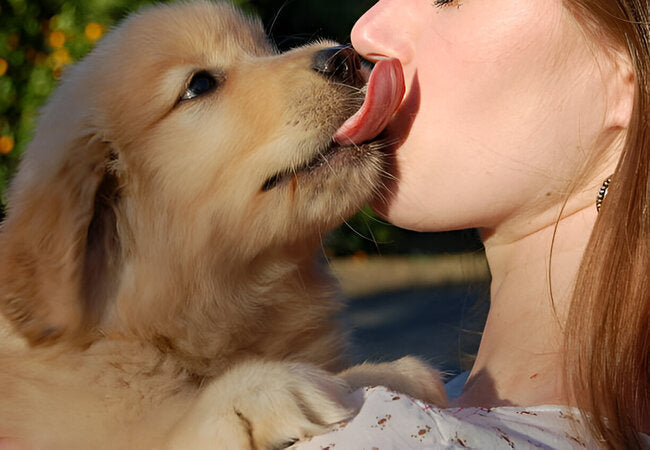Why Dogs Lick Your Face in 2025 – Vet‑Reviewed Insights & Tips 🐶💋

In this article
Why Dogs Lick Your Face in 2025 – Vet‑Reviewed Insights & Tips 🐶💋
By Dr. Duncan Houston BVSc
Licking your face is one of those unmistakably ~wet~ signs of canine affection—but there’s so much more behind it. In this 2025 vet-approved guide, we’ll explore the science-backed reasons your dog licks your face, how to tell which motive applies, and when to enjoy doggie kisses or use gentle training. Let’s celebrate and understand those love taps! 🐾
🧠 1. Affection & Greeting Behavior
Dogs often lick faces, shown by affectionate, greeting behavior rooted in puppyhood, when they licked their mother and littermates. Dr. Burch of the AKC explains how licking evokes security, pleasure, and closeness.
Similarly, psychological studies highlight that licking your face carries a greeting function—and, yes, dogs are essentially giving you kisses.
2. Submissive or Appeasement Signals
Licking can also express deference or calm communication. Just like adult dogs lick dominant dogs to pacify them, your dog may lick your face to say “I come in peace” or avoid tension.
Observe accompanying behaviors like soft eyes, lowered head, and relaxed posture to confirm this social gesture.
3. Grooming Instincts & Scent Gathering
Grooming behaviors extend to humans—your dog may lick your face to groom you and explore your unique scent and taste. They literally “smell” you by licking, learning your emotional state, and reinforcing social bonds.
Dogs’ tongues contain endorphin triggers, making face licking calming for them, too.
4. Attention-Seeking Behavior
If your dog notices they get your attention—positive or negative—when they lick, they may repeat the behavior. Whether to wake you, ask for pets, or food, licking becomes a learned attention-getter.
5. Taste & Food Residue
Salt in your sweat, lotion, or leftovers on your skin can be tasty prompts—dogs are attracted to flavor, and licking becomes a habit.
6. Self-Soothing or Stress Expression
When dogs lick faces or surfaces during stress—like vet visits or thunderstorms—they’re self-soothing.
Look out for persistent licking alongside stress signals like yawning, lip-licking, or body tension.
👁️ Interpreting Context & Body Language
To understand your dog, always pair licking with context:
- Affectionate gestures come with a relaxed body, playful posture, and wagging tail.
- Submission or appeasement licks come with head lowering, eyes softening, and calming postures.
- Attention-seeking or habit licking may involve pacing, whining, and repeating licks after you respond.
- Stress licking occurs with lip licking, yawning, with ears back, or anxious glances.
✅ Is Face Licking Safe or Unhealthy?
For healthy humans, face licking is safe; most dog saliva bacteria are harmless. However, be cautious if:
- You have open wounds—which could lead to infections.
- You are immunocompromised; dogs can carry rare pathogens like Capnocytophaga.
- Licking is obsessive, causing irritation or behavioral concerns.
🐶 Training & Responding Strategically
- If it’s affectionate, enjoy—but redirect occasional overwhelm by offering a toy or chew.
- For attention-seeking licks, ignore or redirect with “sit” or “down” and reward calm behavior.
- If licking signals stress, address the root—use calming tools, training, or seek vet behavior advice.
- Be consistent: don’t reward unwanted face licks to avoid reinforcing them.
📱 Ask A Vet App 2025 Support
With the Ask A Vet app, you can:
- Upload licking videos and photos to assess motives.
- Receive expert guidance if licking is obsessive, stress-related, or medically rooted.
- Access personalized training tips to manage or redirect licking behavior.
A human–dog bond built on trust and clarity—help anytime, anywhere. ❤️🐾
🧩 Quick Reference Table: Why Dogs Lick Your Face
| Reason | Signs | Strategy |
|---|---|---|
| Affection/greeting | Relaxed, wagging tail | Accept, enjoy |
| Submissive/appeasement | Head down, soft eyes | Respond kindly, avoid tension |
| Grooming/sensory | Repeated licking, quiet focus | Let it occur, offer enrichment |
| Attention-seeking | Lick + pacing/whine | Ignore, reward calmer behavior |
| Stress coping | Lip-lick, yawns, tense body | Use calming aids, vet consult |
| Food/salty taste | Licks after eating | Clean face, avoid encouraging |
❤️ Final Thoughts
Face-licking from your dog can be a mixture of love, communication, and instinct. It’s often harmless, usually endearing, and sometimes a meaningful gesture of connection. But when licking becomes compulsive, stress-driven, or discomforting, gentle training and expert help can bring harmony back. Explore your dog’s motive, enjoy their closeness, and nurture a loving bond that stays healthy and clear. 🐶💕
Need tailored advice? Visit AskAVet.com or download the Ask A Vet app for on-demand behavior evaluation and guidance.






